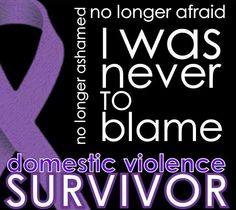 Domestic violence (DV) also known as intimate partner violence is one of the hot button issues, that often is shrouded in mystery and lack of knowledge or understanding. One in four women and one in seven men will be a victim of domestic violence in their lifetime. Many people, despite the availability of information surrounding this type of violence, still have yet to take the time to educate themselves about this very social issue. Public reaction varies from outrage, to blaming the victim. Many garner attitudes akin to “If she stayed then whatever may have happened to her is her own fault.” While others exhibit extreme pity for the victims. I could spend a mountain of time deconstructing the issues associated with these responses this article is dedicated to helping those, who truly desire to help, assist someone in a DV situation. As a former victim of intimate partner violence myself I’m going to provide you with some tools to help someone you love.
Domestic violence (DV) also known as intimate partner violence is one of the hot button issues, that often is shrouded in mystery and lack of knowledge or understanding. One in four women and one in seven men will be a victim of domestic violence in their lifetime. Many people, despite the availability of information surrounding this type of violence, still have yet to take the time to educate themselves about this very social issue. Public reaction varies from outrage, to blaming the victim. Many garner attitudes akin to “If she stayed then whatever may have happened to her is her own fault.” While others exhibit extreme pity for the victims. I could spend a mountain of time deconstructing the issues associated with these responses this article is dedicated to helping those, who truly desire to help, assist someone in a DV situation. As a former victim of intimate partner violence myself I’m going to provide you with some tools to help someone you love.
In order to help you first need to understand that domestic violence is one of the only crimes that occurs fairly equally across race and class lines. What that means is that rich or poor, white, brown, or black the likelihood of this occurring to you or someone you know is the same. The next thing it is necessary to understand is that it is often a process, and occurs in cycles. I know at this point you are wondering how is domestic violence a process? Well there are some key things a perpetrator of DV will do to maintain their control and dominion victim. There are also multiple type of Domestic violence and there is almost always more than one at play in the situation.
- Isolation: Isolation is key; if a victim feels alone they are less likely to seek help because they feel helpless. Initially most victims are isolated by their partner. They may further isolate themselves as a result of shame and embarrassment surrounding their circumstances. They may also be encouraged to stop working or attending school etc.
- Control: A victim may initially see the controlling behavior as loving these behaviors can range from
- stalking
- jealousy
- picking friends and acceptable everyday tasks
- choosing clothing
- Fear
- fear of losing their children if there are any prior to or as a result of the relationship
- fear of homelessness
- fear of further isolation because of circumstance
- fear no one will believe them
The second factor is the cycle of violence. Victims may ‘feel’ safe for long periods of time during the honeymoon phase. This phase occurs after an incident and is usually ushered in with lots of apologies and promises to be different. Immediately following this is the tension building phase. During this stage the victim can feel or knows their partner is going to explode soon, and is generally taking extra steps to try not upset their partner, so as to not encourage the violence. The final stage is the explosion, which is exactly what it sounds like. The situation has boiled over into violence, and the victim is often blamed for the results.
Now that you have a basic understanding of domestic violence let’s look at the types: Physical, emotional, financial, spiritual, and sexual. People are most commonly aware of physical and emotional violence which generally garners all the shock and awe. These types of violence are generally woven together to maintain complete control of the victim. Emotional abuse often leaves victims of DV feeling worthless. Financial abuse can leave them feeling trapped, because they lack the ability to care for themselves and/or children. Spiritual abuse can snuff out a victims hope. The inability to pray or believe in something often adds to the despair and isolation common in DV situations.
So let’s cut to the chase, the whole reason you took a moment to educate yourself to this point, how do you help? The first thing you can do to help is keep your judgment to your damn self!! Yes I know it’s a little harsh, but you must understand on top of the criticism from the abuser no one is more critical of themselves then the victim. Yes it is hard to listen to a friend or loved one if they are brave enough to discuss the abuse with you, and not give them a ‘what you need to do is speech.’ These speeches will solve nothing, in fact they are more likely to isolate than to help. As it hard as it may be your job may be to just listen, and encourage. Remember this individual is most likely taking a mental spanking, positive reinforcement and loving encouragement can go a long way.
Don’t try to force them to leave. There is often a great deal of fear and anxiety associated with DV relationships, forcing someone to leave one can be potentially emotionally damaging to them. Also if they are not prepared to leave they may run back to their partner. The outside world looks very different to a victim of relationship violence, even though they are living in it they are relating to and dealing with the world in a different way than most people. Also be prepared to accept the unfortunate fact that they may not want to, or may be too afraid to leave ever. This is the hardest scenario to accept because it’s hard to envision this ending well in any regard.
Help them make a plan. If you can be a part of their plan. Planning is essential to leaving the relationship successfully. As a part of the planning process look for local resources; shelters and organizations that specialize in helping victims of DV. A lot of websites offer an escape link so as not to alert the partner. If they do decide to leave encourage them to make a list of reasons why they are leaving. If they are in a situation where they may have to be in contact with their partner this can be key in helping them maintain their position. Also understand that sometimes victims do go back, I went back twice, it was the third time that I finally left for good.
Don’t drag yourself into the middle. Do not confront the victims partner, threaten them, or try to take matters into your own hands. This is not guaranteed to be successful and may result in more abuse for the victim. Further more if you were on the allowed list you may find yourself on the reject list, and the victim further isolated. If you are aware of the victim being attacked, report it. Often they will not open the door for law enforcement but there will be a record of calls to the house which may be useful for the victim later in the event of any legal matters. In addition depending on the laws in the state if you are a witness to the matter the victim may not have a say in the course of action taken. Be prepared for the victim to potentially be angry with you for intervening if they were not yet prepared to leave they may pass the blame to you.
The next step is to spare them your pity. Yes pity can feel good, and it’s nice to know that people see the horror in your situation, but pity can lead to a crutch. The victim needs to be able to stand up and move from the victim mentality. This will be a long hard road, especially if they do not seek outside assistance. Group counseling for victims of domestic violence can help the victim not feel so alone. It is helpful to share the stories with others, and learn from the experiences. Individual counseling can help a former victim to identify the patterns of behavior in their lives that might lead them to accept such circumstances. It can also help you heal and start the journey towards ‘normal.’
Finally be understanding it is a long hard road to becoming a whole person and trusting yourself completely after such an ordeal. I am four years out of my toxic relationship of 17 years, and my road to healing is wrought with setbacks. There were times when I left for the final time that I still considered going back again. It took loving encouragement and subtle reminders I made for myself to stay away. It also took the prayers and unconditional of love of family and friends who were there for me each step of the way. There is no exact right way to deal with domestic violence, trust your instincts and heart but be smart in how you proceed so as to not increase danger for the victim or yourself. Above all else let love and kindness be your greatest actions and assets when trying to help.
Domestic violence resources :
National domestic violence hotline : 1-800-799-SAFE (7233)
www.nrcdv.org
Originally published 9/14/16
